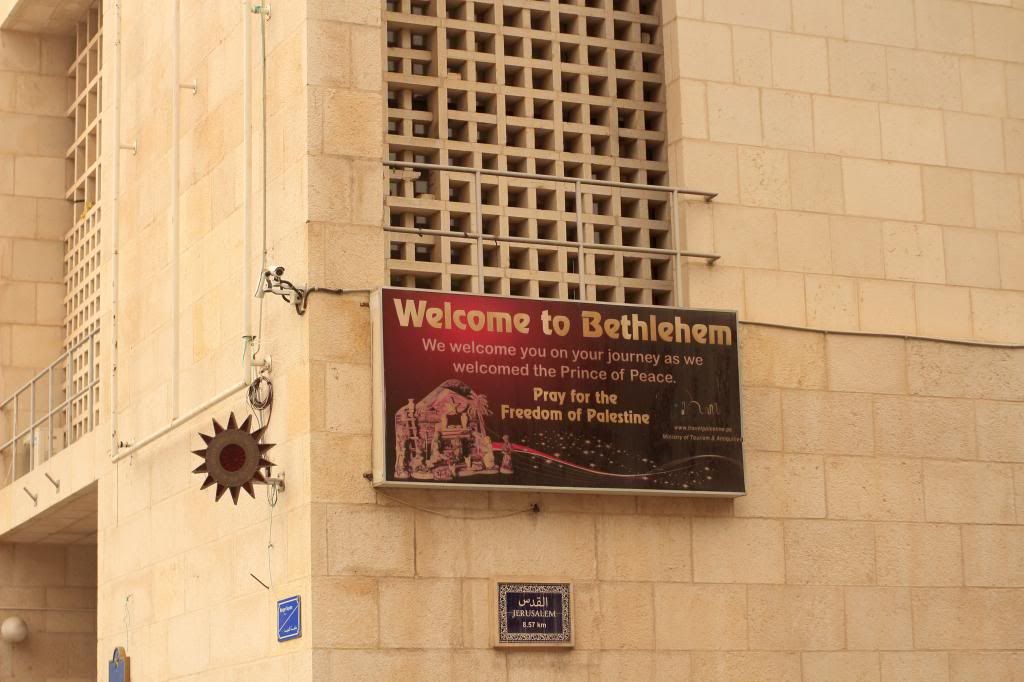While we were recently in Israel our tour company –Educational Opportunities Tours – hosted a brief evening discussion of current issues
between Israel and Palestine. It was an
informative and illuminating discussion.
In his opening five minute remarks, the Palestinian representative detailed the history between the two groups going back to the British administration that followed the end of World War I. He described the various resolutions and treaties that have been made (and broken.) He listed the points of conflict: the illegal (and increasing) Jewish settlements in Palestinian areas, the control of water, security checkpoints, the walls etc…
When the Israeli representative spoke he said, in essence, “We don’t trust them. How can we have peace when we can’t trust them? They say they want peace but we don’t trust them.”
In his opening five minute remarks, the Palestinian representative detailed the history between the two groups going back to the British administration that followed the end of World War I. He described the various resolutions and treaties that have been made (and broken.) He listed the points of conflict: the illegal (and increasing) Jewish settlements in Palestinian areas, the control of water, security checkpoints, the walls etc…
When the Israeli representative spoke he said, in essence, “We don’t trust them. How can we have peace when we can’t trust them? They say they want peace but we don’t trust them.”
 I was a little surprised by the stark differences between their
presentations. (I didn’t bring my audio
recorder to the meeting. I wish I had. )
These two men are friends (or at least
friendly). They have worked together for
some time. It wasn’t a rancorous or
acrimonious debate. But still I was
surprised by how differently they approached the story.
I was a little surprised by the stark differences between their
presentations. (I didn’t bring my audio
recorder to the meeting. I wish I had. )
These two men are friends (or at least
friendly). They have worked together for
some time. It wasn’t a rancorous or
acrimonious debate. But still I was
surprised by how differently they approached the story.
U.S. Secretary of State, John Kerry, has been working with Palestinian and Israeli negotiators,
attempting to help bring them to some peaceful resolution. His target date of April 29, 2014 is looming closer
and closer, and yet Israel is attempting to delay. President Obama has commended Palestinian
President Mahmoud Abbas for consistently renouncing violence, and consistently
seeking a diplomatic and peaceful solution that allows for two states, side by
side, in peace and security.
Meanwhile, Israeli Prime Minister, Benjamin Netanyahu offers no concessions and insists that "Israel has been doing its part [to make peace]” and says that he regrets “that the Palestinians have not."
Meanwhile, Israeli Prime Minister, Benjamin Netanyahu offers no concessions and insists that "Israel has been doing its part [to make peace]” and says that he regrets “that the Palestinians have not."
Neither half of this statement is altogether
accurate. If Netanyahu were serious
about Israel’s commitment to peace, he would (at minimum) enforce the ban
against expanding Israeli settlements in Palestinian areas –10,589 housing settlement units have been built on Palestinian-claimed territory since
negotiations began less than eight months ago! - and he would
recognize that it is Palestinian negotiators who are trying to hold to the
April 29 deadline for peace talks and have been commended for their work
towards this process.





No comments:
Post a Comment